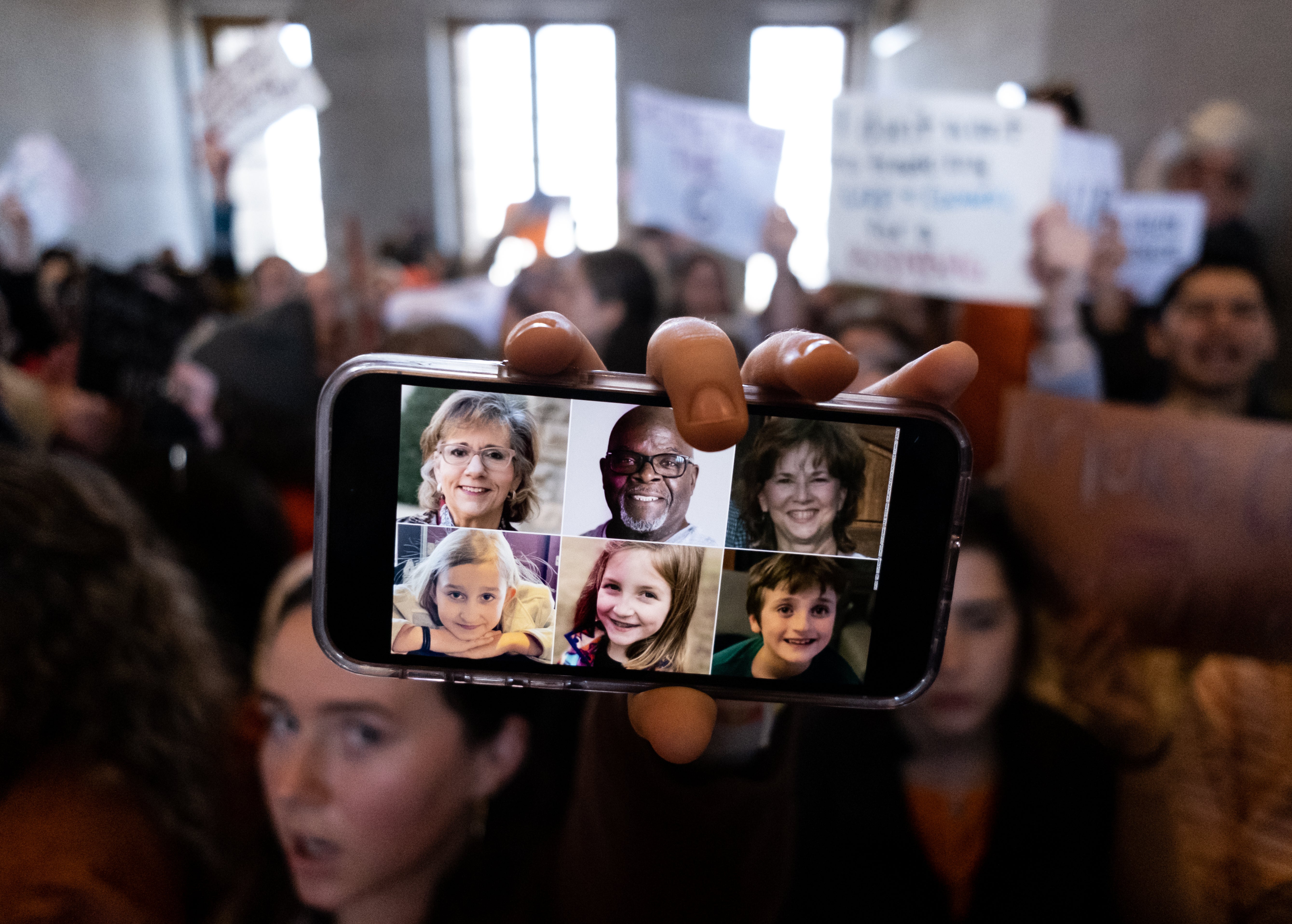America’s gun lobby counts major legislative victories after Nashville. Republicans shrug off reform
State lawmakers across the country are making it easier to buy and carry guns, while GOP members of Congress insist there’s nothing they can do to stop gun violence, Alex Woodward reports


In his letter to the governor outlining his legislative priorities around school safety, Tennessee’s Lieutenant Governor Randy McNally proposed stronger windows, magnetic glass, cameras and armed guards. He did not mention the word “gun” or “firearm” at all in his two-page letter, which compared his proposals to combat the epidemic of mass shootings in American schools to regulations that have “decreased the amount of school building fires.”
His letter echoes a similar response among Republican officials in the aftermath of the massacre inside a Nashville elementary school on 27 March, when a heavily armed assailant equipped with an AR-style rifle, a 9mm pistol calibre carbine and a 9mm handgun killed three nine-year-old children and three school employees.
In state legislatures across the US, Republican lawmakers are making it easier for people to carry guns without a permit, limiting gun-free zones, and eliminating background checks for gun purchases and so-called “red flag” laws to prevent people who could be a threat to themselves or others from possessing them.
And in Washington DC, congressional Republicans have largely shrugged off repeated demands to take any action to combat the proliferation of assault-style weapons that killed six people in Nashville and hundreds of others in American mass shootings over the last decade.
After the deadliest school shooting in the state’s history, Tennessee lawmakers have put all legislation with modest gun reform measures on pause for the rest of 2023. But several measures to expand gun access are still likely to pass through the state’s legislature.
Before the shooting, Tennessee lawmakers were considering legislation to lower the age of permitless carry from 21 to 18 years old, with one version of the bill expanding that provision to all firearms, not just handguns. Another measure would arm teachers and school staff.
Democratic state legislators said they were told that gun reform-related bills were off the table until 2024, and Senate Judiciary Chair Todd Gardenhire told local outlet Tennessee Lookout that his committee would not hear anything related to gun bills this year.
“There have been some voices suggesting that we shouldn’t even consider legislation relating to firearms given this week’s tragedy,” state Senator Jeff Yarbro told The Washington Post. “I fundamentally reject that notion and don’t understand how we can responsibly call ourselves representatives of citizens and not take this on.”
The day after the Nashville shooting, North Carolina’s Republican-controlled state Senate voted to override the Democratic governor’s veto of a bill that allows residents to buy a handgun without a permit from a local sheriff.
The bill, which has immediate effect, eliminates a long-standing permit system that mandates local law enforcement to check the criminal histories of prospective handgun buyers.
Gun buyers in the state still are subject to a national background check and concealed weapons permits, but Democratic lawmakers warned that the law could allow people convicted of domestic abuse or at risk of suicide to easily obtain a firearm. The law also will allow firearms on some school properties where religious services are held.
The day after the Nashville shooting, the National Rifle Association celebrated news that a hearing on a law in Colorado to ban semi-automatic firearms had been delayed.
Legislation from Democratic lawmakers to control the proliferation of assault-style weapons in Colorado specifically referenced their use in several mass shootings in the state. The bill describes gun violence as “an American epidemic that no other industrialized country experiences at remotely the same level” and declared the ban “necessary for the immediate preservation of the public peace, health or safety.”
Carrying a concealed weapon without a permit will be legal in more than half of US states
In Nebraska, one day after the Nashville shooting, the NRA celebrated state legislation to remove gun registration requirements and allow concealed carry without a permit. Three days later, Florida’s GOP-controlled legislature approved a similar bill that Republican Governor Ron DeSantis is expected to sign into law.
On 30 March, Mr DeSantis travelled to Georgia for a rally at one of the biggest gun stores in America.
“I’m proud to be able to stand here and say that we support our Second Amendment rights,” he said in his remarks.
“If Governor DeSantis really cared about public safety and protecting law enforcement, he’d be back in Florida fighting to keep guns out of the wrong hands and vetoing the deadly permitless carry legislation sitting on his desk,” Makiko Felice, a volunteer with the Florida chapter of gun reform advocacy group Moms Demand Action said in a statement. “Instead, he is campaigning in Georgia to pacify gun extremists.”
The states join at least 25 others that allow permitless concealed carry, a measure that has been rapidly adopted by lawmakers across the US as part of what right-wing activists have called a “constitutional carry” movement in recognition of the Second Amendment.
Lawmakers approved similar measures in Arizona, Iowa, Montana, Tennessee, Texas and Utah in 2021. Last year, lawmakers passed similar bills in Alabama, Georgia, Indiana and Ohio.
Republicans in Washington shrug off reform: ‘We’re not gonna fix it’
The United States is largely alone in its ambivalence towards or outright rejection of demands to ban assault weapons despite leading the world in the number of gun deaths from high-powered firearms.
There have been more than 131 mass shootings in the US this year, according to the Gun Violence Archive. Within the first three months of 2023, more than 10,000 Americans have died from acts of gun violence.
Following the Port Arthur massacre in 1996, Australia’s government enacted legislation to restrict the possession of semi-automatic rifles. After a white supremacist armed with two AR-15 rifles killed 51 people inside two mosques, New Zealand banned semi-automatic firearms and the parts to make them. America’s northern neighbour Canada also banned AR-style rifles in 2020 following a two-day shooting rampage in Nova Scotia.
Republican lawmakers deny the connection.
“We’re not going to fix it,” Republican US Rep Tim Burchett of Tennessee told reporters in Washington DC hours after the shooting in his homestate. “Criminals are going to be criminals.”
“There’s no such thing as gun violence,” Louisiana US Rep Clay Higgins told a House committee two days after the Nashville attack.
“There’s only human violence. It’s intellectually unsound to state otherwise,” he added.
South Dakota Republican Senator Mike Rounds suggested that Congress has done enough.
“When we start talking about bans or challenging the Second Amendment, the things that have already been done have gone about as far as we’re going with gun control,” he told CNN.
Joe Biden’s final, frustrated appeals to Congress hit a brick wall
President Joe Biden – who has pressed Congress more than 70 times to act on gun reform and ban assault weapons since he entered the White House in 2021 – vehemently disagrees with GOP lawmakers who insist they have done all they can do.
His frustrated appeals to lawmakers include an urgent demand to reinstate a federal ban on assault weapons, a measure that was in place from 1994 until its expiration in 2004, and may have prevented 11 mass shootings in the decade it was in effect. Keeping the ban in place until 2019 would have prevented 30 public shootings that killed 339 people and injured 1,139 others, according to one study.
The president told reporters on 28 March that his administration’s executive actions to date have reached the limits of what he can do as president, unless Congress sends him a bill to sign into law.
“I have gone the full extent of my executive authority to do, on my own, anything about guns,” said Mr Biden, adding that Congress “needs to act” if the US is to have any new laws governing the proliferation of AR-style firearms that have dominated the gun market and killed hundreds within the last decade.
Within his first two years in office, there have been roughly 1,400 mass shootings.




Bookmark popover
Removed from bookmarks